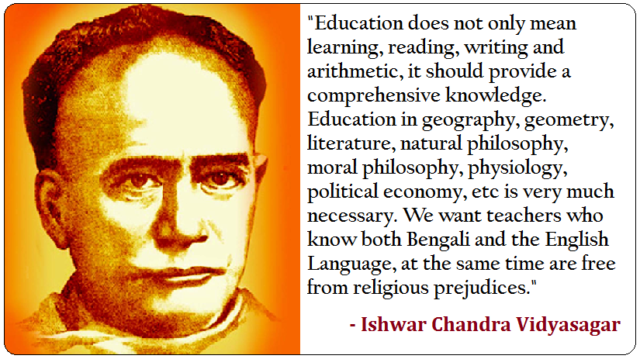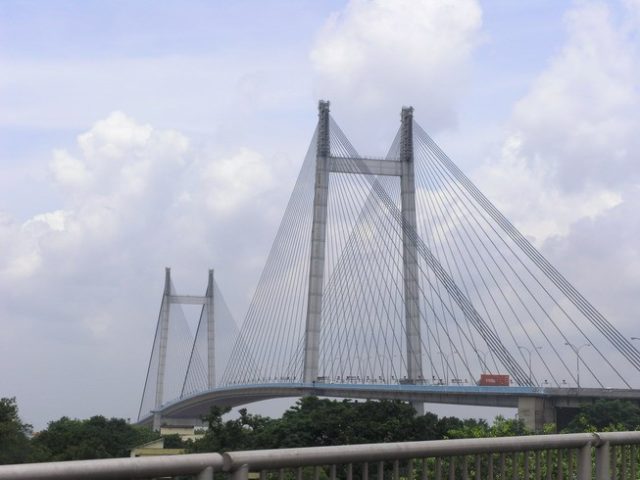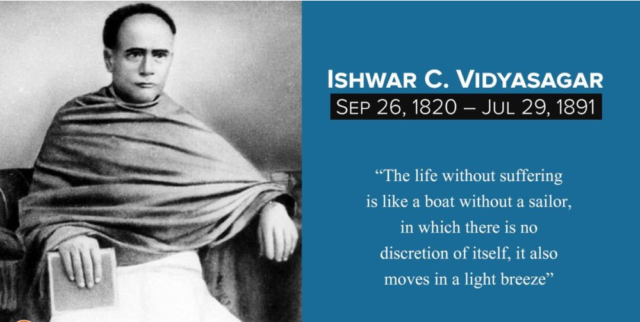PREVIOUS
Ishwar Chandra Vidyasagar
June 4 , 2019
2247 days
37258
0
- Vidyasagar was liberal in his outlook even though he was born in an orthodox Hindu Brahmin family.
- He was born Ishwar Chandra Bandyopadhyay.
- Born in 26 September 1820 at Birsingha village in the Ghatal subdivision of Paschim Midnapore District in current day West Bengal.

- His parents are Thakurdas Bandyopadhyay and Bhagavati Devi.
- As was the custom then Ishwar Chandra married at the age of fourteen.
- His wife was Dinamani Devi.
- Narayan Chandra Bandyopadhyaya was their only son.
- In the year 1839, Ishwar Chandra Vidyasagar successfully cleared his law examination.
- He took part in a competition testing knowledge in Sanskrit in 1839.
- He earned the title of ‘Vidyasagar’ meaning Ocean of Knowledge from Sanskrit college of Calcutta when he was only twenty-one years old.
- The title 'Vidyasagar' (ocean of knowledge) was given to him due to his vast knowledge in several subjects.
- One of the most important moment in his life of Vidyasagar was when he met Ramakrishna at his own abode.
Educational Reforms
- In 1841, at the age of twenty-one years, Ishwar Chandra joined Fort William College as head of the Sanskrit department.
- After five years, in 1846, Vidyasagar left Fort William College and joined the Sanskrit College as 'Assistant Secretary'.
- In 1849, he resigned from Sanskrit College and re-joined Fort William College as a head clerk.
- When he came back to the Sanskrit College once again as a Professor in 1850s, Vidyasagar made to include English and Bengali as the medium of learning, besides Sanskrit.
- He became the Principal of Sanskrit College in 1851 by which he had become the first Indian principal of the Government Sanskrit College.
- He also changed the rules of admission for students in Sanskrit College allowing non-Brahmin students to enrol in the prestigious institution.
- He wrote two books ‘Upakramonika’ and ‘Byakaran Koumudi’, interpreting complex notions of Sanskrit grammar in easy legible Bengali language.
- He introduced the concepts of Admission fee and tuition fee for the first time in Calcutta.
- Vidyasagar established Barisha High School in Kolkata in 1856 helped by Amulya Ambati the reformer.
- Vidyasagar College, named after Pundit Ishwar Chandra Vidyasagar, is a government-sponsored college, affiliated to the University of Calcutta in North Kolkata.

- It was the first private college in India which was run by the Indians, taught by the Indians and financed by the Indians.
- The college was founded by Pundit Ishwar Chandra Vidyasagar in 1872.
- It was formerly known as Metropolitan Institution.
Social Reforms
- He was an ardent advocate of women education.
- He opened 35 schools for women throughout Bengal and was successful in enrolling 1300 students.
- He even initiated Nari Siksha Bhandar, a fund to lend support for the cause.
- He maintained his support to John Elliot Drinkwater Bethune to establish the first permanent girls’ school in India, the Bethune School, on May 7, 1849.
- Vidyasagar championed the upliftment of the status of women in India, particularly in his native Bengal.
- With support from people like Akshay Kumar Dutta, Vidyasagar introduced the practice of widow remarriages to mainstream the Hindu society.
- The Hindu Widows' Remarriage Act, 1856, also known as Act XV of 1856, enacted on 26 July 1856, legalised the remarriage of Hindu widows in all jurisdictions of India under the East Indian Company rule.
- It was drafted by Lord Dalhousie, but it was passed by his successor Lord Canning before the Indian Rebellion of 1857.
- It was the first major social reform legislation after the abolition of Sati by Lord William Bentinck.
- Ishwar Chandra Vidyasagar was the most prominent campaigner for this reform.
- He petitioned the Legislative council, but there was a counter petition against the proposal with nearly four times more signatures by Radhakanta Deb and his Dharma Sabha.
- He even married his son Narayan Chandra to an adolescent widow in 1870 to set an example.
His works
- He wrote a number of books that hold primary importance in Bengali culture.
- His book, ‘Borno Porichoy’ (Introduction to the letter), is still used as the introductory text to learn Bengali alphabets and reformed it into typography of 12 vowels and 40 consonants.

- He started to publish Bengali Newspaper Shome Prakash in 1858.
- He was associated with prestigious journalistic publications like ‘Tattwabodhini Patrika’, ‘Sarbashubhankari Patrika’ and ‘Hindu Patriot’.
- He established the Sanskrit Press with an aim to produce printed books at affordable prices so that common people could buy them.
Last stage of his life
- Ishwar Chandra Vidyasagar spent the last 18 to 20 years of his life among the Santhals at 'Nandan Kanan', Karmatar in the District of Jamtara, the modern day of Jharkhand.
- The station Karmatar has been renamed as 'Vidysagar' railway station in his honour.
- He passed away on July 29, 1891 at the age of 70 years in Calcutta, Bengal Presidency, British India.
His Legacy
- Vidyasagar Setu (commonly known as the Second Hooghly Bridge) is a bridge over the Hooghly River in West Bengal, India. It links the city of Howrah to its twin city of Kolkata. The bridge is named after Ishwar Chandra Vidyasagar.

- Vidyasagar College in Kolkata as well as Vidyasagar University (established in 1981) in Paschim Midnapore is named after him.
- It was founded by the mathematician and statistician from the University of Cambridge, Anil Kumar Gain.
- A fair named Vidyasagar Mela, which is dedicated to spreading education and increasing social awareness, has been held annually in West Bengal since 1994.
- Since 2001, it has been held simultaneously in Kolkata and Birsingha.

- In the tradition of Raja Rammohan Roy, the aristocratic Bengali reformer who preceded him, Vidyasagar linked education to social change and empowerment.
- One of his famous quotes was “The life without suffering is like a boat without a sailor, in which there is no discretion of itself, it also moves in a light breeze”.

- After his death Rabindranath Tagore said, "One wonders how God, in the process of producing forty million Bengalis, produced a man!".
- - - - - - - - - -
Leave a Reply
Your Comment is awaiting moderation.


